WE REMEMBER, WE ARE PROUD!

Bunin Leonid Petrovich
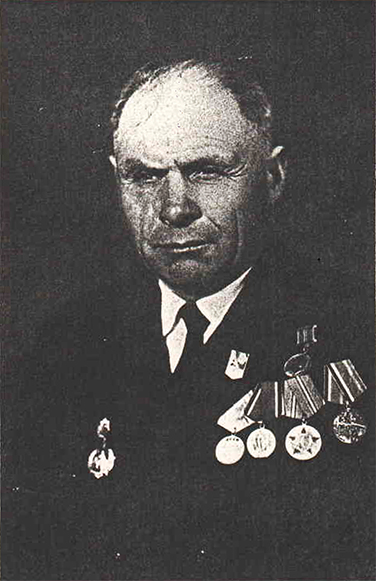
He was born on July 22, 1922 in the village of Mitino in the Glyadyansky district of the Kurgan region.
On August 27, 1941, at the age of 19, he was drafted into the ranks of the Soviet Army and sent to the Rybachy Peninsula to the 12th separate rifle brigade of the Northern Navy in Battalion No. 3, reconnaissance platoon. Then he was transferred to the 63rd Marine Rifle Brigade, 556 coastal battery.
A story about one of the combat operations.
At the end of August 1942, Commander Petrov gathered us (scouts). He said that we would land reconnaissance at Cape Pikshui. There was a command to scout the location of the enemy's battery, not to engage in battle. In the evening, cars came up, took us to the bay of Eine, where we boarded the boats "sea hunters" and went to the rear of the enemy. They landed without interference, each squad was given a specific task. Our squad needed to scout out where the enemy battery personnel were located. We explored where their dugout was located, it was in a rock. Then we went back to the boats. When everyone gathered, boarded the boats and sailed back to their island, the commander interviewed everyone and, upon arrival on the island, reported to the command about the operation without entering into battle.
On September 1, 1942, there was an alarm, we were all raised and explained that we would all go by amphibious assault to the Bay of Eine, where a brigade reconnaissance company and a rifle company of the 63rd Marine rifle Brigade would join us. We arrived in the bay of Eine, it got dark, boarded the Sea Hunters and sailed to Haddock. We landed quietly, calmly, went to the battery, quietly got close, quickly found the object (dugout), took up positions and waited for the general signal (red rocket). At the signal, we got up and went to the dugout. Someone went to the door, someone to the windows. I climbed onto the roof with a grenade and lowered it into the pipe, and I rolled off the roof. An explosion sounded, a noise arose, the cries of the Germans were heard, we began to shoot the dugout, the sappers blew up a mountain German battery, four-gun. A green escape rocket took off. At 4 o'clock we finished the operation, left, boarded the boats and sailed back. We had no losses, only two wounded, but we counted 157 Germans killed and 11 captured. When we approached our shore, we were met by the commissar, the head of the political department Torik, congratulated us on the successful completion of the operation, "Now our bay of Eine will work calmly," he said.
On November 18, 1942, in one of the battles on the Rybachy Peninsula, the Musta-Tanturi Ridge, he received a severe head wound.

Igishev Grigory Vasilyevich
Private, fought as part of the 483rd infantry regiment of the 6th mechanized Brigade, defender of Leningrad, participant of the victory parade in Berlin.
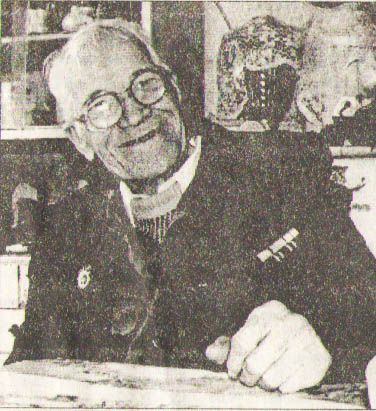
In August 1942, eighteen-year-old Grigory Igishev, after short-term courses in the Elan military camps and taking the oath, found himself in the Kalinin direction. He took the first battle, liberating the Luban station, which is on the Leningrad direction.
With each successive approach to Leningrad, the fighting became fiercer and fiercer. The Germans were well aware that their defeat in this direction meant the failure of the movement to Moscow and access to the Baltic Sea.
At the beginning of February 1943, the unit in which our countryman fought went to Narva. Massive artillery preparation and heavy fire from both sides spoke of the seriousness of the upcoming operation.
In one of the battles, the shell-shocked Grigory Igishev was taken to the medical battalion, then sent for a re-commission and determination of fitness for further service.
Stubbornness and the desire to be close to his comrades-in-arms helped to get back into service and again find himself near Leningrad in the native division of General Govorov.
The liberation of Leningrad did not end the war for Grigory Vasilyevich. In the regimental reconnaissance he reached Germany, was wounded. I had to take the "language", see the horrors of war, the death of my comrades. In one of the battles, only eighty people remained from the regiment during the day.
In June 1945, in Berlin, he participated in the parade of the victorious troops, which was hosted by G.K. Zhukov. I met in Germany with the French, Americans participating in the defeat of the Germans. I even saw Queen Elizabeth, who brought uniforms to the soldiers. At that time, she personally participated in providing patronage assistance to the front.

Novikov Luka Perfilievich (1912-2005)
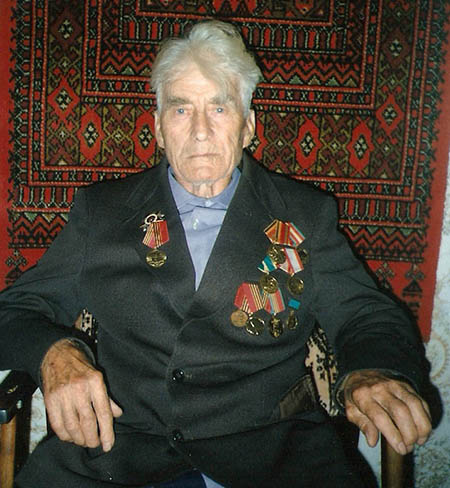
He fought from 1941 to 1946
Participated in the Japanese War
He served in the Far East in the infantry, as a machine gunner.

Pozdnyakov Pyotr Savelyevich (born in 1901)
Drafted in 1941. Glyadyansky RVC
Missing __.12.1941
![]()

Popov Pavel Alexandrovich
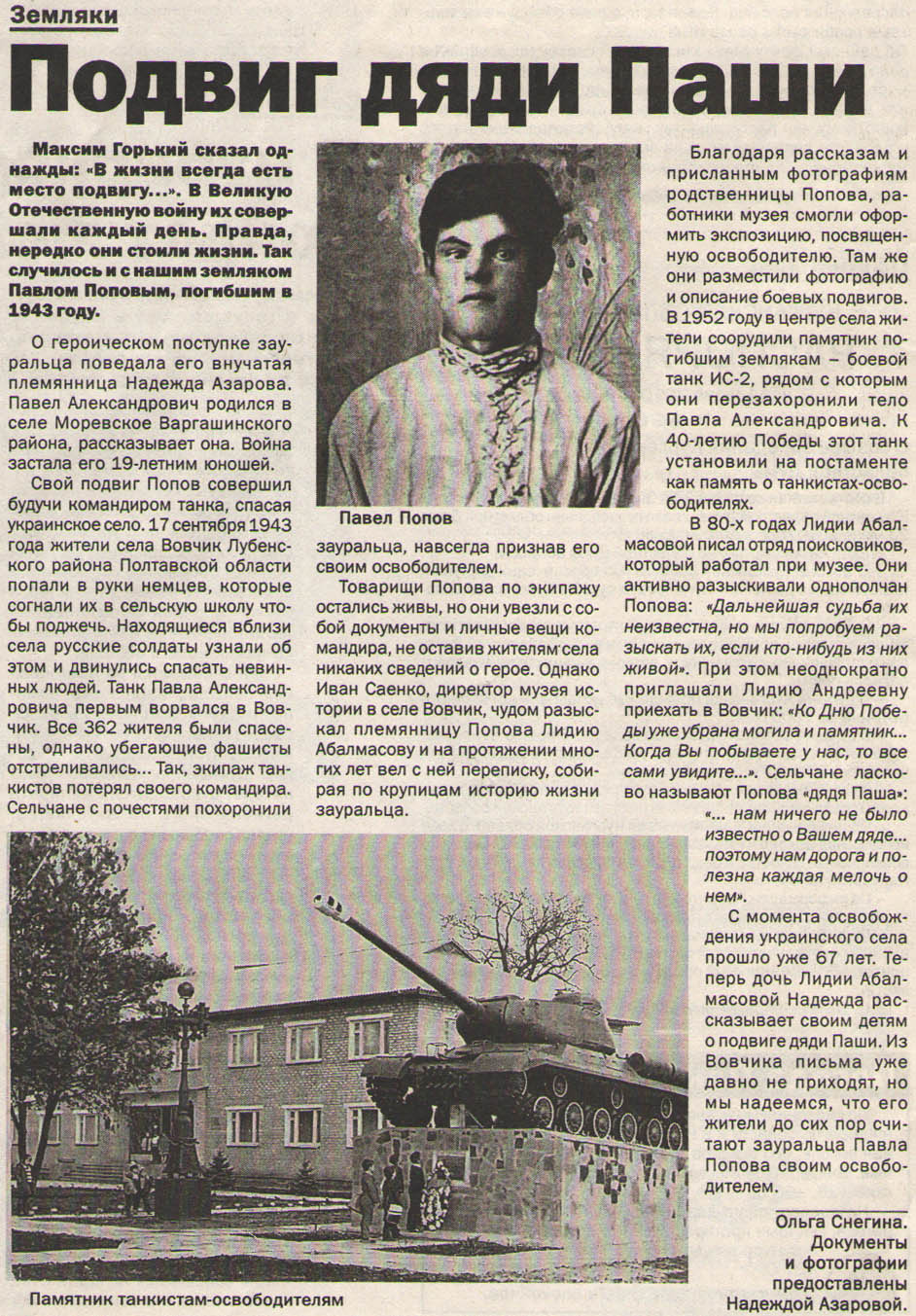

Smetanin Sergey Petrovich (born in 1927)
Drafted in 1944. Belozersk RVC.
He was awarded the Order of the Patriotic War II degree, the Medal "For Bravery"


Vasily Ivanovich Khrushchev (born in 1920)
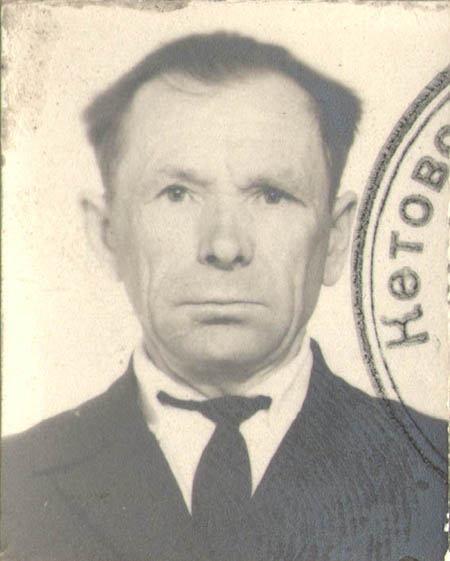
08.1940-06.1942 Kiev Military District, South-Western Front. Private. 299 airbase.
06.1942-07.1943 Voronezh Front. Squad leader, Sergeant. 43 tank regiment.
07.1943-03.1944 Kazan. On the cure. Evacuation Hospital No. 167.3.
03.1944-08.1944 Leningrad Military District. Cadet. 32 tank training regiment.
08.1944-08.1945 Volga Military District. Mechanic-driver, gv. art. sergeant. 42 tank regiment.
08.1945-05.1946 Primorsky Military District. Mechanic-driver, senior sergeant. 3 tank corps.

